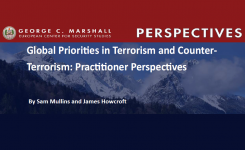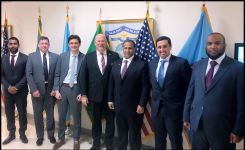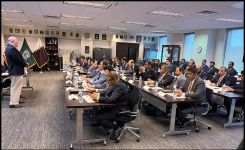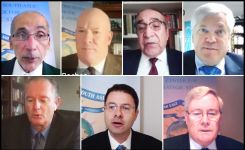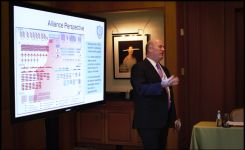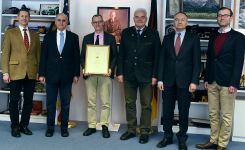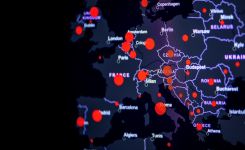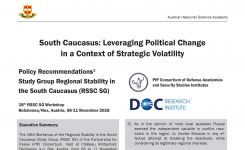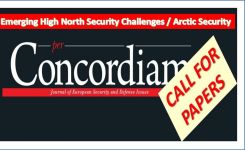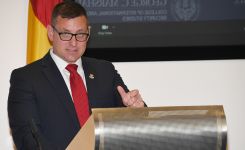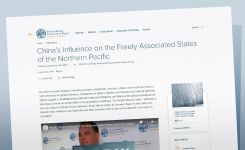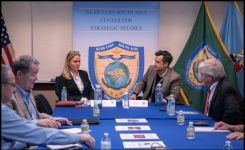Security Studies

Podcast: Dr. Perl on working both separately and together to address global security problems
ISN Video In this podcast, Raphael Perl discusses how a multitude of networks and non-aligned states have been working both separately and together to address global security problems. We need both frameworks, he argues, if we are to surmount the institutional inertia that continues to...
Policy Guidance for Pakistan’s Oscillation Response to COVID-19
“Policy Guidance for Pakistan’s Oscillation Response to COVID-19” is a new OpEd coauthored by DKI APCSS professor Dr. Deon Canyon and Asma Khawaja – Strategic Studies, National Defence University, Islamabad, for Security Nexus. In this paper, the authors detail how shifting policy guidance...
Politics by Numbers: Counting Plato’s Shadows
James Sullivan is currently a non-resident Visiting Scholar at the Daniel K. Inouye Asia Pacific Center for Security Studies and is pursuing an ALM in International Relations from Harvard Extension School.His paper analyzes China’s use of tone when addressing various security issues relevant...
PTSS Faculty Publish Results of CT Survey
This research note reports the results of a pilot questionnaire on priorities in terrorism and counter-terrorism, which was completed by seventy-five security-sector professionals from more than fifty countries who attended the Program on Terrorism and Security Studies (PTSS) at the George C....
PTSS Program Director James Howcroft Published in The American Interest
PTSS Program Director James Howcroft Published an article in The American Interest online magazine. The article explores how to put intelligence to work against ISIS terrorists returning from Syria to their countries of origin. Full text of the article, entitled "Dare to Share", can be...
Qatar Armed Forces Doctrine and Concepts Visit
The Near East South Asia (NESA) Center for Strategic Studies hosted the visit of the Director of the Qatar Armed Forces Doctrine and Concepts Center, General Abdullah al-Ammari, and his staff on 15 March 2023 in Washington, D.C. NESA Center Deputy Director COL David Lamm, USA (Ret.) and NESA...
Qatar Joint Staff College Visit
From 15–20 May 2022, the NESA Center hosted the Washington Visit of Qatar’s Joaan bin Jassim Command and Staff College Senior Officer Program in Washington, DC. The 35 participants included senior military officers and senior leaders from various Qatari government agencies. This program was...
Qatari Diplomatic Institute Virtual Seminar
From 08-10 November 2021, Dr. Gawdat Bahgat led the Qatari Diplomatic Institute Virtual Seminar to help foster a shared understanding of the evolving strategic landscape in the Middle East and promote mutual cooperation. The seminar was attended by over 100 officials from the Qatari Ministry...
Raytheon Royal Saudi Air Defense Forces Executive Leadership Program
On 17-29 October 2021, The Near East South Asia Center for Strategic Studies (NESA Center) held a Raytheon Royal Saudi Air Defense Forces Executive Leadership Program in Washington DC and Boston, Massachusetts. Major General Abdullah al Qahtani (head of the Royal Saudi Air Defense Forces...
Re-accreditation of the M.A. International Security Studies (MISS)
By Frank Mouritz Academic Coordinator and Deputy Director M.A. International Security Studies (MISS) GARMISCH-PARTENKIRCHEN, Germany (Feb. 20, 2019) – The master’s program in International Security Studies (MISS), which is offered jointly by the Marshall Center and the Bundeswehr...

Reawakening of Japanese Nationalism
APCSS' professors Dr. Jeffrey Hornung and Dr.David Fouse, as well as former APCSS professor Dr. Yoshiro Sato, appeared on "Asia in Review" to discuss "Reawakening of Japanese Nationalism". Here is the link to the recorded program: http://www.youtube.com/playlist?list=...
Recommendations for Policy Makers in the Western Balkans are Out
Vienna, Austria, 6 December 2021- The PfPC’s Regional Stability in South East Europe Working Group (RSSEE WG) published policy recommendations from its 41st Workshop titled “Regional Security Cooperation in South Europe in the Aftermath of North Macedonia’s NATO Accession” through the Austrian...
Recommendations from Papua New Guinea on How to Improve U.S. Posture in the Pacific
Excerpt: The Pacific Ocean is a place of many small countries that need to strategically cooperate, not compete, to survive. The best way forward is for all nations to cooperate with each other as they tackle the greatest threats and make the world a safer place. The U.S. and China have...

Regional Security Cooperation in the Maghreb and Sahel: Algeria’s Pivotal Ambivalence
By Laurence Aïda Ammour. Africa Center for Strategic Studies, February 2012. Despite growing concerns across the Sahel and Maghreb over the increasing potency of al Qaeda in the Islamic Maghreb, the diffusion of heavily armed mercenaries from Libya, the expanding influence of arms and...
Regional Stability in the South Caucasus Study Group (RSSC SG) recommends the establishment of an “OSCE Minsk Group Plus (+)”.
The Minsk Group Plus (+) recommendation is included in a list resulting from a November 2018 RSSC SG workshop; ”South Caucasus: Leveraging Political Change in a Context of Strategic Volatility”. Additional recommendations include: Refreshing the mediation process for the Nagorno-...
Religion in a Values-Based Approach to Strategic Competition
“Religion in a Values-Based Approach to Strategic Competition” is the title of a paper written by DKI APCSS professor Dr. Alfred Oehlers forSecurity Nexus. This article asks the question “Can we bring religious faiths and beliefs to bear in our strategic competition with our competitors?”...
Reminder: Marshall Center Alumni Call for Papers!
Attention Marshall Center Alumni, We are still seeking alumni contributors for the next edition of per Concordiam, which will examine the topic of “Emerging High North Security Challenges”. Please consider this opportunity to be published in the Marshall Center’s premier journal. per...
Report from the Research Field: The Alumni Scholarship Experience
Report from the Research Field: The Alumni Scholarship Experience By John Quinn, 2021 Alumni Scholar I first came across the George C. Marshal European Center for Security Studies, or The Marshall Center, webpage after Russian annexation of the Crimean Peninsula and tanks seized much of...
Report on China’s Influence on the Freely Associated States of the Northern Pacific
“China’s Influence on the Freely Associated States of the Northern Pacific” was published September 2022 by the United States Institute of Peace (USIP).Dr. Lori Formancontributed to this report as part ofthe USIP China-Freely Associated States Senior Study Group led byAdmiral (Ret.) Philip...
Roundtable Discussion on the Pros & Cons of Ankara’s Balancing Act with the Ukraine-Russia War
In acknowledgment of the one year since Russia began its full-scale invasion in Ukraine, Near East South Asia (NESA) Center for Strategic Studies Executive Officer Sam Marrero moderated a roundtable withNigar Gökselfrom Crisis Group Türkiye on Friday, 3 March 2023, on the ‘Pros and Cons of...
Pages





The European Defense Sector and EU Integration
This paper reviews the history of the European integration process, with a focus on the political, economic and legal aspects relevant to security. First, it examines the specific aspects of the defense sector to explain why governments prefer cooperation to integration. The subsequent section...

The European Union and Developments in Crisis Management Operations and Peacekeeping
This article addresses the developments involved in the creation of a framework for the European Security and Defense Policy (ESDP). The author examines the tools available under the Second Pillar of the EU, including the publication of a European Security Strategy supported by an attendant...

The European Union`s Energy Security Challenges
This article examines some of Europe’s critical energy security challenges and EU efforts to coordinate a common European energy strategy. The author explains how energy policy, still mostly decided on a national basis, is gradually seen in a wider European context and how it is slowly being...

The Expanding Security Agenda: Challenges for Transition States
This article analyzes human trafficking, a modern-day equivalent of slavery, within Eastern Europe. The author examines the patterns of trafficking in the region, determines links between corruption and trafficking and identifies possible networks for countertrafficking activities in the region.


The Future of the Sinai Peninsula
The Sinai Peninsula has been a center of conflict for many years, starting with the first Arab-Israeli war in 1948. After Israel and Egypt signed the Camp David Accords in 1978, it became a peaceful region, strongly controlled by the military during Hosni Mubarak’s rule in Cairo. Now, after several...

The Georgia Crisis: Implications for the Partnership for Peace
This article examines the South Ossetia crisis of August 2008 and its impact on NATO's Partnership for Peace (PfP). The author discusses implications of Russia's actions in the South Caucasus and addresses both the short- and long-term implications of the crisis in Georgia for the PfP.

The importance of the Council of Europe’s 24/7 Network of Contact Points on Foreign Terrorist Fighters
The article focusses on the Council of Europe 24/7 Network of Contact Points on Foreign Terrorist Fighters envisaged in article 7 of the Additional Protocol to the Council of Europe Convention on the Prevention of Terrorism adopted on 22 October 2015. The Protocol supplements the 2005 Council of...


The Institutionalization of Security Risk Assessment
This chapter discusses the institutionalization of risk assessment within the framework of NATO’s Partnership Action Plan for Defense Institution Building (PAP-DIB). One of the Action Plan’s objectives is "effective and transparent arrangements and procedures to assess security risks and national...
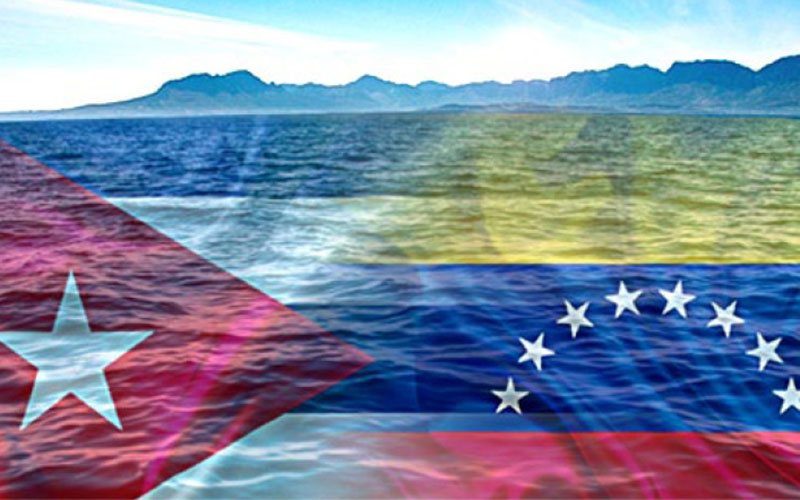
The Intent and Impact of US Sanctions on Cuba and Venezuela
National governments and international bodies like the United Nations (UN) and the European Union impose economic sanctions to force changes in behavior, whether that is through coercion, deterrence, punishment or shame to the countries, entities and individuals that endanger their interests or...




